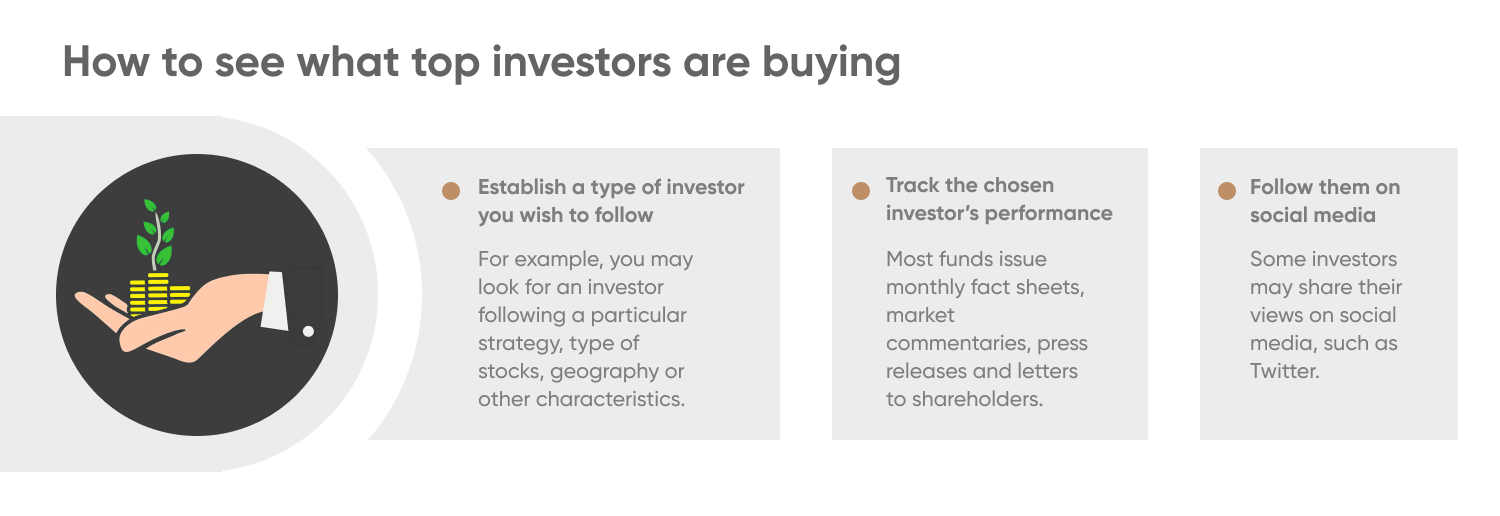How to see what big investors are buying: Research can help to find best buys
We take a look at how to see what big investors are buying and the difference this can make to your portfolio.
Every investor wants to know which companies are likely to make them money – and who better to ask than the world’s most successful shareholders?
Many top investors such as Warren Buffett, Bill Ackman, George Soros and Peter Lynch have become household names on the back of achieving bumper returns. But while most of us won’t be lucky enough to have such individuals on speed dial when we want investment advice, we can look to emulate their decisions.
Numerous documents are published every day that give an insight into the thinking of the most successful stock pickers and their rationale behind particular investment calls. Here we look at how to find what big investors are buying, suggest investors to follow, reveal the lessons we can learn from them and highlight potential pitfalls to avoid.
Who are the top investors?
The good news is there are plenty of successful institutional investors in the world – and many have made huge profits for themselves, their firms or their partners. These individuals are usually at the helm of prominent investment funds that pool capital and buy into either growing or established companies around the world.
Their goal is usually to pick the right stocks that are either undervalued by global stock markets or have the potential to deliver far better-than-expected returns. Of course, there’s no hiding in the world of investing. Their success or failure is clear for everyone to see in the performance tables.
Who is the most successful investor of all time? One of the most prominent players is Warren Buffett. The American businessman is chief executive of Berkshire Hathaway, the conglomerate involved in a wide variety of areas.
In his most recent letter to shareholders, Buffett revealed Berkshire’s compounded annual gain from 1965 to 2021 was 20.1% – almost double the 10.5% achieved by the S&P 500 Index (US500).
He emphasised his goal was to have meaningful investments in businesses with durable economic advantages and first-class chief executives.
He pointed out that both himself and Charlie Munger, his long-time partner, described themselves as business pickers and not stock pickers.
Many leading investors have enjoyed success by embracing different approaches. A prime example was the late Jack Bogle, founder of the Vanguard Group. Bogle, who died in 2019 at the age of 89, introduced index tracker funds that provided people with a cheaper way to invest.
In contrast to Warren Buffet, Bogle’s investment philosophy is focused on passive investing strategy, where investors hold broadly diversified low-cost exchange traded funds (ETFs). Today, the “Bogglehead” investing community forum has 90,000 registered users with 2,000 posts everyday.
A statement issued by Vanguard to mark his passing, noted he’d attained “legendary status” in the American investment community for his achievements.
“He introduced the first index mutual fund for investors and, in the face of sceptics, stood behind the concept until it gained widespread acceptance; and he drove down costs across the mutual fund industry by ceaselessly campaigning in the interests of investors,” the company said
How to see what big investors are buying
Who are the best investors to follow and how to see what investors are buying using public information and resources?

The best starting point is establishing the type of investor you wish to emulate. For example, if you’re looking to invest in the US market then it makes sense to focus on a fund manager that appears to have a similar investment objective.
While past performance is no guarantee of future returns, looking at the longer-term track record of a manager can highlight the strength of returns during certain periods. Most funds issue monthly fact sheets and market commentaries in which they discuss their favoured holdings and reasons why the fund outperformed the market or fell short.
As we have already mentioned with Warren Buffett and Bill Ackman, some investors will also publish letters to shareholders that give a deeper insight into their respective strategies. Press releases are often issued by investment houses. It’s worth paying attention as these can include their longer-term views on asset classes.
More recently, social media has become a favoured platform for investors to share their views on the economy and individual companies.
Following prominent industry names can give you an insight into their views on particular sectors and industries, as well as potentially being the first to hear of any announcements they make.
One prominent businessman that uses Twitter frequently is Tesla’s co-founder Elon Musk. Last year he put up a poll on the platform asking readers whether they agreed with his proposed selling of 10% of his Tesla stock.
Benefits of following top investors’ advice
The major benefit of tracking major investors’ decisions is that they’ve usually got access to significantly more resources than individuals.
These can include access to senior managers within the companies they’re following and an army of experienced analysts to pore over the numbers. This level of scrutiny should enable them to pick up on both positive and negative factors that the broader stock market may have overlooked.
Many of them have also been investing for decades. Nothing can replace the depth of knowledge built up over many years, especially having navigated numerous investment cycles.
Former Fidelity fund manager Peter Lynch is a great example. For the 13 years that he ran Fidelity’s Magellan Fund (1977–1990), he earned a reputation as a top performer, increasing assets under management (AUM) from $18m to $14bn.
In a video interview recorded by Fidelity, Lynch insisted it was important to realise that behind every stock is a company. He also acknowledged that the calls may not work out.
What could go wrong?
The harsh reality is that even top investors don’t always get it right. There are far too many variables in the world for their decisions to be 100% correct every time.
International conflicts, economic factors, political uncertainty and even unforeseen events such as a global virus can cause share prices to rise or fall sharply in a matter of hours.
Following the decisions of prominent investors can be a useful indicator but it comes with a health warning, according to James Yardley, senior research analyst at Chelsea Financial Services.
Yardley acknowledged that it was “foolish” to ignore what other smart investors are doing but believes you need to view their calls with a critical eye.
Of course, we can learn a lot from prominent investors’ mistakes and changes of heart. A prime example came in April 2022 when Bill Ackman, founder of Pershing Square Capital Management, explained how his opinion on Netflix (NFLX) had changed.
In a letter to shareholders, he revealed the holding in the company had been sold in light of changes in the company’s future subscriber growth.
“One of our learnings from past mistakes is to act promptly when we discover new information about an investment that is inconsistent with our original thesis. That is why we did so here,” he declared.
Note that even top investors can get their predictions wrong. Their opinions and investment decisions shouldn’t be used as a substitute for your own research. Always conduct your own due diligence before investing. And never invest or trade money you cannot afford to lose.
FAQs
What is Warren Buffett buying?
The favoured holdings of Warren Buffett were outlined in his latest letter to shareholders and included technology giant Apple (AAPL). Another favoured name is BNSF, one of the largest freight railroads in North America.
What is Elon Musk investing in?
Elon Musk often publishes information about his views and investments on Twitter. In a thread posted earlier this year, he declared it was “generally better” to own physical things such as a home or stock in companies you think make good products. However, he also noted that he still owned – and won’t sell – his “Bitcoin, Ethereum or Doge” cryptocurrency investments.
Who is the most accurate stock analyst?
This will change constantly. Earlier this year, for example, TipRanks published its list of the top 25 analysts in the world. Top of the list was John Gerdes, who covers basic materials at MKM Partners.
Who is the most accurate stock picker?
This is impossible to say, as many factors go into whether a decision proves to be accurate or ends up missing the mark. It’s best to carry out your own research and look at how particular investors have performed during various periods.